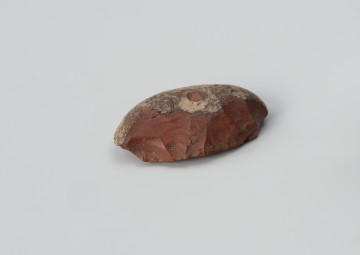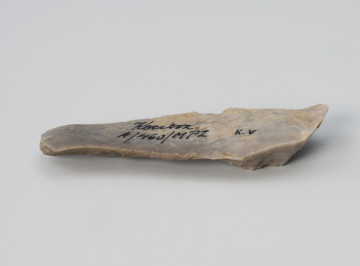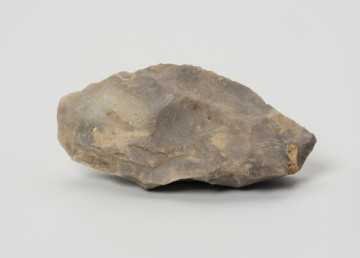
Scraper
7800 p.n.e. — 2000 p.n.e.
National Museum in Szczecin
Part of the collection: Stone Age
The blade core from Szczecin-Bukowo comes from a surface prospecting carried out in 1939. The site was discovered about 30-40 years earlier. The results of research carried out at the site for almost a century indicate that a new group set up a short-lived camp at the site every few hundred years. The core was made of exceptionally high-quality chalk flint. It was used to break off a part-processed blade. At the time of abandonment, it had already been heavily excavated crucial information can no longer be deciphered, especially about the initial processing of the raw lump and the early phases of exploitation. It is known, however, that the blades were struck with a hammerstone. The surface on which the maker struck, the so-called heel, was formed in one blow and was not corrected. Also, the edge between the heel and the striking surface - the surface from which the semi-raw material "falls off" - does not have smoothing traces. These are important observations, demonstrating the maker's high competencies. The core was used until it could not be held in hand due to its small size. The core from Szczecin-Bukowo should be linked to the early Maglemose culture dated to the early Mesolithic phases. A typical element of flint-making in the communities of this culture is the extraction of part-processed blades from cores, the so-called single-stack cores, using a hard pestle. It is evidenced by the irregular shape of the blades, which are also quite thick. Raw splinters and blades were often used as tools without retouching the edges. Compared to the Late Palaeolithic era, the flint-work of the early Mesolithic era gives the impression of being significantly simplified.
Michał Adamczyk
Author / creator
Dimensions
cały obiekt: height: 3.2 cm, width: 3.3 cm
Object type
lithic core, production waste
Technique
carving, hard masher carving
Material
flint, stone
Origin / acquisition method
acquisition
Creation time / dating
Creation / finding place
Owner
National Museum in Szczecin
Identification number
Location / status

7800 p.n.e. — 2000 p.n.e.
National Museum in Szczecin

12700 p.n.e. — 11500 p.n.e.
National Museum in Szczecin

7800 p.n.e. — 7000 p.n.e.
National Museum in Szczecin
DISCOVER this TOPIC
National Museum in Szczecin
DISCOVER this PATH
Educational path